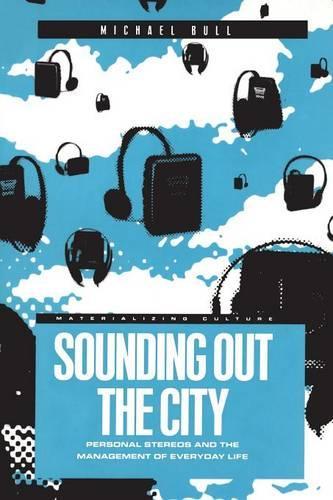
Sounding Out the City: Personal Stereos and the Management of Everyday Life
(Paperback)
Available Formats
Publishing Details
Sounding Out the City: Personal Stereos and the Management of Everyday Life
By (Author) Michael Bull
Bloomsbury Publishing PLC
Berg Publishers
1st September 2010
United Kingdom
Classifications
General
Non Fiction
303.48
Physical Properties
Paperback
216
Width 156mm, Height 234mm, Spine 11mm
Description
On buses, trains, and streets over the past decade and more, youths in particular but increasingly older people as well tune into their personal stereos and tune out city sounds. Why What does the personal stereo mean to these people and to urban culture more generally Does it heighten reality Enable people to cope Isolate Create a space Combat boredom Far too commonplace and enduring to be considered a fashion accessory, the personal stereo has become a potent artefact symbolizing contemporary urban life. This book opens up a new area of urban studies, the auditory experience of self and place. In doing so, it enhances our understanding of the role of media and technology in everyday life. Urban, cultural and anthropological studies have been dominated by explanations of experiences drawing upon notions of visuality. But culture always has an auditory component that shapes attitudes and behaviour -- perhaps nowhere more so than in the city where sound is intensified. This book challenges strictly visual approaches to culture by proposing an auditory understanding of behaviour through an ethnographic analysis of personal stereo use. The author reformulates our understanding of how people, through the senses, negotiate central experiences of the urban, such as space, place, time and the management of everyday experience, and examines the critical role technology plays. This book will be of interest to anyone seeking a fresh and incisive approach to urban studies, cultural studies, anthropology, sociology, or media and communication studies. 'This is a splendid book. Theoretically sophisticated, empirically compelling and opening up a new agenda for the study of the media by directing our attention, and not before time, to sound.' Roger Silverstone, Professor of Media and Communications, LSE
Reviews
'[A] fascinating phenomenology of the personal stereo.' The Guardian 'Through narcissism, voyerism, and urbanism, Sounding Out the City listens to its fields' erotics and resists the temptation to turn sound into geography. It sticks close to the taboos of what everybody knows but rarely says,that which is traditionally passed by on the way to culture.' Sociological Review 'This text was thought provoking to the reviewer. It is an analysis that should be read by those interested in the interaction of the routine with imagination in media use and those looking to develop understanding of urban life that recognize the importance of sound.' Journal of Consumer Culture 'Reaffirms the Walkman's iconic status in cultural studies provides interesting insights.' Times Higher Education Supplement 'Bull examines the complex relationships among sensory perception, technology, urban dwellers, and urban experience and uses his own insights to engage with the ideas of writers such as Adorno, Benjamin, Simmel, and Lefebvre. Abundantly illustrated with interview quotations.' Choice 'Michael Bull's important and engaging book breaks new ground by providing a theoretically and empirically rich account of what the personal stereo means in everyday life that effortlessly draws us into wider questions about the complexity of contemporary experience.' New Media Society 'Empirically rich - a fascinating contribution to some new ways of thinking about the activities that we can find in our cities and their potential for affecting urban culture'. City 'Without attempts like this, no break with the familiar or the possible would occur. (The author's) work points to important gaps in urban theory and research and should be read for its generative quality.' American Journal of Sociology 'A solid, grounded contribution, which will be of great relevance to those interested in urban life, technology and music.' American Ethnologist 'This is a splendid book. Theoretically sophisticated, empirically compelling and opening up a new agenda for the study of the media by directing our attention, and not before time, to sound.' Roger Silverstone, Professor of Media and Communications, LSE
Author Bio
Michael Bull Lecturer in Media Studies,University of Sussex
